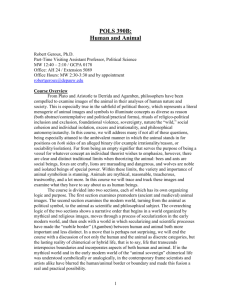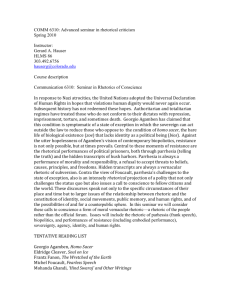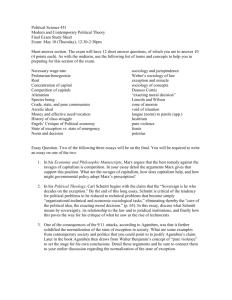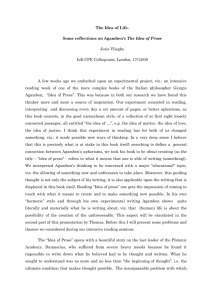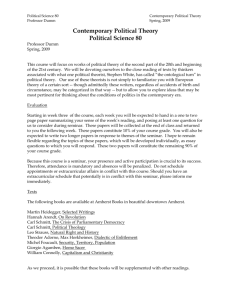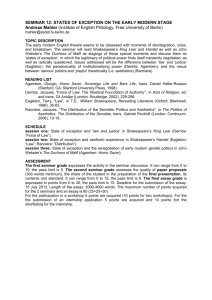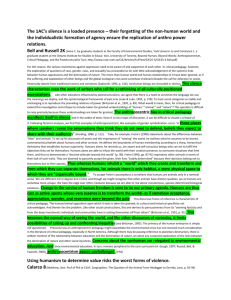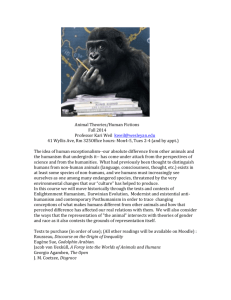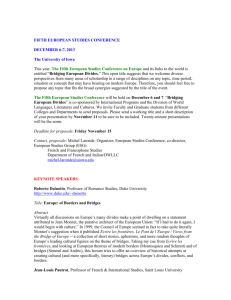Alberto Toscano - Goldsmiths Research Online
advertisement
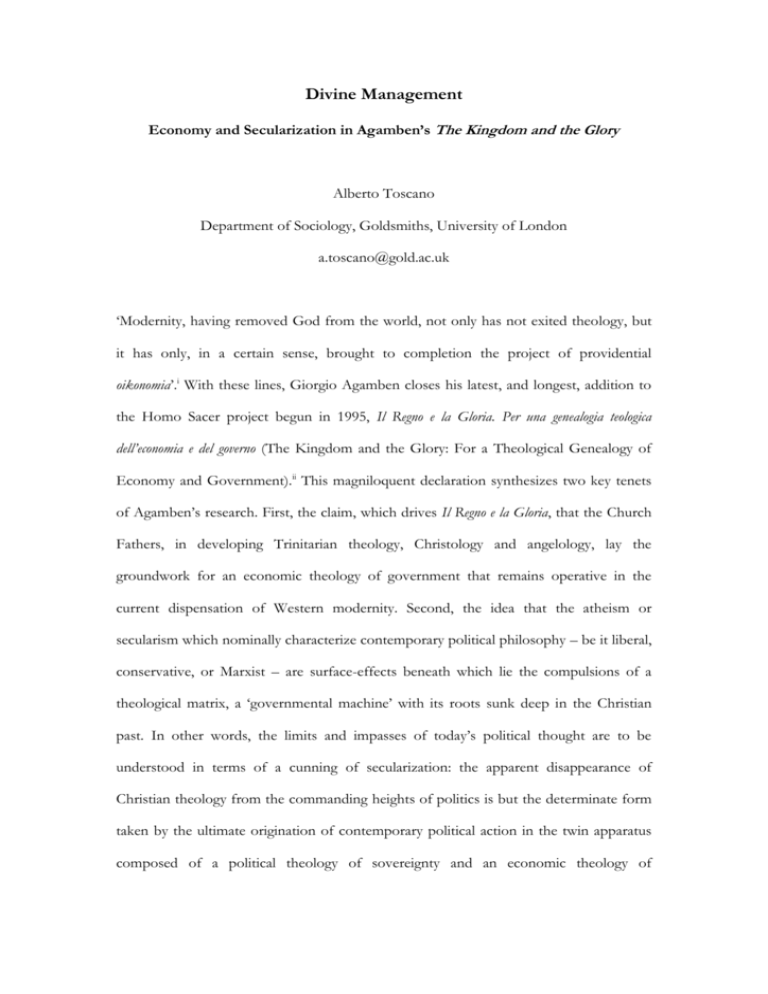
Divine Management Economy and Secularization in Agamben’s The Kingdom and the Glory Alberto Toscano Department of Sociology, Goldsmiths, University of London a.toscano@gold.ac.uk ‘Modernity, having removed God from the world, not only has not exited theology, but it has only, in a certain sense, brought to completion the project of providential oikonomia’.i With these lines, Giorgio Agamben closes his latest, and longest, addition to the Homo Sacer project begun in 1995, Il Regno e la Gloria. Per una genealogia teologica dell’economia e del governo (The Kingdom and the Glory: For a Theological Genealogy of Economy and Government).ii This magniloquent declaration synthesizes two key tenets of Agamben’s research. First, the claim, which drives Il Regno e la Gloria, that the Church Fathers, in developing Trinitarian theology, Christology and angelology, lay the groundwork for an economic theology of government that remains operative in the current dispensation of Western modernity. Second, the idea that the atheism or secularism which nominally characterize contemporary political philosophy – be it liberal, conservative, or Marxist – are surface-effects beneath which lie the compulsions of a theological matrix, a ‘governmental machine’ with its roots sunk deep in the Christian past. In other words, the limits and impasses of today’s political thought are to be understood in terms of a cunning of secularization: the apparent disappearance of Christian theology from the commanding heights of politics is but the determinate form taken by the ultimate origination of contemporary political action in the twin apparatus composed of a political theology of sovereignty and an economic theology of government and administration – with the latter, as Il Regno e la Gloria endeavours to show, playing the key part. It is not possible in a few pages truly to gauge the import of Agamben’s thesis, or indeed properly to assay the cogency of his archaeological claims. This essay will simply seek to evaluate the relevance of the inquiry laid out in Il Regno e la Gloria to a radical interrogation of the relationship between politics and economics, understood in terms both of its historical dynamics and of its contemporary articulation. To do this, I will proceed in three steps. First, it will be necessary to get some purchase on what is meant by the ‘theological genealogy of the economy and government’ announced by the book’s subtitle. This will involve subjecting to scrutiny Agamben’s reliance on a certain understanding of secularization, of the kind that permits him to declare that modernity merely brings to completion the Christian ‘economy’ of providence, or indeed that Marx’s notion of praxis ‘basically is only the secularization of the theological conception of the being of creatures as divine operation’.iii As I hope to show, Agamben’s work relies on a type of historical substantialism that clashes with his own avowed allegiance to genealogy as method. Second, Agamben’s suggestions about the genealogical thread running from Trinitarian oikonomia all the way to Smith’s invisible hand, and implicitly all the way up to the present, will be contrasted to understandings of the (modern) economy which, premised on the limitlessness of monetary accumulation, transcend their absorption and exhaustion by a theological genealogy. Finally, I will turn to the political dimensions of Agamben’s archaeological excavations – in particular his delineation of the economic-theological notion of administration – and ask whether they might permit a deconstruction of the Marxist reference to communism as the withering away of the state and the shift towards an ‘administration of things’. On method Why the turn to a ‘theological genealogy’ of the economy? The impetus behind Agamben’s choice seem to be twofold. On the one hand, there is a desire to prolong Foucauldian insights into ‘biopolitics’, according to which the primacy of sovereign power is both supplanted by, and recombined with, a government of life wherein power is not primarily aimed at sheer domination or dealing out death, but at a productive management of individuals and populations. On the other, Agamben takes his cue from a debate between Carl Schmitt and the theologian Erik Peterson, taking his distance from Schmitt’s allegiance to the idea of political theology and showing that Peterson himself steps back from admitting the significance to the early Christian theologians of the notion of oikonomia. Agamben’s study is primarily a painstaking and erudite investigation into the different figures taken by the ‘economy’ in early Christian theology, all of which revolve around a basic semantic constellation (a Sinn, rather than a Bedeutung, as Agamben specifies), where economy stands for an immanent and ‘an-archic’ management, a generalised pragmatics. In other words, where Foucault had located, beginning in the mid-eighteenth century, the emergence of ‘governmental reason’ in the early discourse of political economy and the concurrent practice of administering the health and productivity of populations,iv Agamben turns the clock two millennia, to the writings of Aristotle and Xenophon on oikonomia, then to the fate of this notion within the theology of the Church fathers, beginning with Paul. Defined by Aristotle as the ‘administration of the house’, in contradistinction with the form of collective or public power exercised in the polis, in Xenophon ‘oikonomia is presented as a functional organisation, an activity of management which is not bound to rules other than that of the orderly functioning of the house (or of the undertaking in question). It is this “managerial” paradigm that defines the semantic sphere of the term oikonomia (as of the verb oikonomein and of the noun oikonomos) and determines its progressive analogical broadening outside of its original limits’.v As Agamben details, the oikonomia is modelled by Xenophon on the organisation that reigns over an army or within a seafaring vessel. But if the semantic core of the idea of economy is already implanted in Ancient Greek philosophy, why engage in a theological genealogy? By this syntagm Agamben evidently intends more than tracking the applications and mutations of oikonomia in the ambit of Christian theology. What is at stake becomes clearer when Agamben comes to the discussion of the place of oikonomia in what he calls the providential paradigm and the ‘ontology of acts of government’ that underlies it. As he writes: ‘Providence (government) is that through which theology and philosophy try to deal with the splitting of classical ontology into two separate realities: being and praxis, transcendent good and immanent good, theology and oikonomia. It presents itself as a machine aimed at rearticulating together the two fragments in the gubernatio dei, in the divine government of the world’.vi A theorem from Seinsgeschichte – the sundering of being and praxis – is adduced to account for the determining significance of Christian theology in shaping the political and metaphysical horizon of ‘the West’ (a term that Agamben seems to employ without much qualification or reflection) up to ‘our’ very own modernity. In this regard, it is the specifically Christian fate of oikonomia, as the anarchic immanence of a divine government tenuously articulated, via providence, with a transcendent God who ‘reigns but does not govern’, which justifies the theological character of this genealogical investigation. For Agamben, the ‘providential dispositif (which is itself nothing but a reformulation and development of theological oikonomia) harbours something like the epistemological paradigm of modern government’. In the guise of separation between ‘legislative or sovereign power and executive or governmental power’, the modern state inherits ‘the theological machine of the government of the world’. Agamben indicates one of the more troubling facets of this inheritance in his beguiling archaeology of the notion of ‘collateral effects’, and the related ‘collateral damages’. As he writes: ‘The paradigm of the act of government, in its pure form … is the collateral effect. To the extent that it is not directed toward a particular end, but it derives, as a concomitant effect, from a law and general economy, the act of government represents a zone of undecidability between the general and the particular, between the calculated and the non-wanted. This is its “economy”.’vii But by what right does Agamben pass from the insistence of certain conceptual constellations and semantic kernels across different epochs and discursive formations to the overarching conviction that such an archaeological inquiry is of urgent political significance? Note that unlike a historian of ideas or concepts who might wish to track the secret endurance and operative impact of certain thought-patterns across periods and conjunctures, Agamben is unconcerned with forms of transmission beyond textual ones. When, for instance, he states that Malebranchian occasionalism transits into Rousseau’s conceptions of political economy and popular sovereignty, or that a theological notion of order subtends Smith’s invisible hand, the terms of this pernicious theological inheritance are not contrasted to alternative genealogies. Nor does Agamben consider the possibility that the resilience of certain thought-forms might be less relevant than their redeployment to radically different ends within incommensurable discursive formations. Nor, finally, is there a serious consideration given to the possibility – abetted, for instance, by the derivation, which Agamben himself shows, of the theological dispositif of bureaucracy from the empirical history of empires – that it is not so much the continuity of the theological, but the persistence of certain social relations and their imaginaries which explains the insistence of certain ideas of government throughout such a longue durée. It is symptomatic in this respect that, at the very outset of the book, Agamben dismisses the theoretical significance of the secularisation debate that pitted the likes of Blumenberg, Schmitt and Löwith against one another in the 1960s – treating it merely as a cloaked struggle over the philosophy of history and Christian theology. For Agamben, secularization is a strategic gambit, not a historiographic thesis. As a strategy, secularization – for instance, as famously deployed by Schmitt – involves the polemical reference of political terms to their theological origin. It is here that Agamben introduces a rather mystifying ‘methodological’ term, that of the segnatura (signature). Secularization functions as an element within a science of signatures, that is, a study of ‘something that, in a sign or a concept, marks it and exceeds it to refer it back to a determinate interpretation or a determinate domain, without thereby departing from the semiotic to constitute a new signification or a new concept’.viii In a recent methodological essay that traces the genealogy of the signature, Agamben cites a study of Les mots et les choses by the Italian scholar Enzo Melandri, where the latter refers to the signature as a ‘kind of sign within the sign; it is that index which, in the context of a given semiology, univocally refers back to a given interpretation’.ix Leaving aside for the moment the rather perverse torsion which permits Agamben to turn a term which, as he recognises, Foucault locates in Paracelsus and a pre-Enlightenmental episteme of resemblance into a notion of which Foucault’s own theory of the statement in The Archaeology of Knowledge is but an instance, it is worth insisting on what happens to the idea of secularization once it is treated as ‘a strategic operator, which marked [segnava] political concepts to refer them back to their theological origin’.x Such a conviction, accompanied by the rather mystical postulation that only some may ‘possess the capacity to perceive signatures and to follow the dislocations and displacements that they operate in the tradition of ideas’, xi means that there is no need to actually gauge the mechanisms that allow for the transition from one discursive field to another, since the very presence of the signature immanently refers us back to an origin in the theological field, which accordingly, in a move dissected in Hans Blumenberg’s work, delegitimates the political concepts themselves. Political economy, for example, is reduced to a ‘social rationalisation of providential oikonomia’.xii The ‘theory’ of signatures thus seems to engage in what we could call a reductivist idealism, a mirror-image of sorts of the much-maligned Marxian reduction of ideal structures to social relations – a materialist move which certain passages of Agamben’s book would make rather more plausible than the search for theo-economic signatures, for instance when, referring to the pseudo-Aristotelian treatise De Mundus, Agamben shows how the perception of the governmental apparatus of the Persian king would influence the later image of divine hierarchies, as ‘the administrative apparatus through which the sovereigns of the other conserve their kingdom becomes the paradigm of the divine government of the world’.xiii But something more problematic is at stake than Agamben’s reference to a mode of research, the search for signatures, which so heavily depends on putative personal insight and analogical thinking. This has to do with the idea of a theological origin. Behind this reference lies not only Agamben’s sympathy towards the Schmittian variety of secularization but the conviction, mediated by a pervasive Heideggerianism, of a historical-ontological continuity which allows one to argue that our political horizon is still determined – and worse, unconsciously determined – by semantic and ideational structures forged within a Christian theological discourse. Though Agamben does not straightforwardly embody the apologetic Christian purposes that Hans Blumenberg identifies in the discourse on secularization – the idea that the conceptual patrimony of the Church was expropriated and misused – he does manifest one of the key aspects of that discourse, the idea of a substantial continuity, without which, we could add, the theory of the signatures becomes inoperative. As Blumenberg writes: ‘Only where the category of substance dominates the understanding of history are there repetitions, superimpositions and dissociations – and also, for that matter, disguises and unmaskings’. Despite his inevitable Heideggerian protestations to the contrary, it is only the idea of an underlying continuity – the continuity of historical-ontological destiny – that can allow Agamben, to cite Blumenberg, ‘to identify the substance in its metamorphoses’. Against the idea of a history that is veiled to itself, of secularization as a kind of spell, which only the man of signatures could dispel, it might be worth reflecting on the suggestion that ‘there exists a high degree of indifference between a concept and its history’.xiv Along these lines, it is difficult to ignore that the Schmittian and Heideggerian lenses through which Agamben approaches Foucault’s methodology lead to a glaring neglect of the maxims that orient Foucault’s work – above all the Nietzschean and Bachelardian principle of genealogical and archaeological discontinuity. As Foucault elucidates in his seminal essay ‘Nietzsche, Genealogy, History’, the notion that there is no semantic conservation, and that genealogy is concerned with dispersed events of heterogenesis and truncated lineages, means that the search for continuities which defines the history of ideas must be subjected to unsparing critique. Nietzsche’s genealogy of morality is accordingly juxtaposed to his friend Paul Rée’s history of morality. The latter ‘assumed that words had kept their meaning, that desires still pointed in a single direction and that ideas retained their logic; and then ignored the fact that the world of speech and desires has known invasions, struggles, plundering disguises, ploys’. Hence Foucault’s reference to the ‘singularity of events outside of any monotonous finality’, as what the genealogist must concern himself with, in a spirit of documentary ‘restraint’ with respect to a history ‘without constants’. Only the ‘grey’ work of genealogy can break with the pious, metaphysical idea that things have a timeless essence, or indeed an unchanging semantic or ontological core, revealing instead ‘the secret that [things] have no essence or that their essence was fabricated in a piecemenal fashion from alien forms’.xv Not just the origin, but the idea of a disguised ‘unthought’, is repudiated by Foucault for the sake of the discontinuous positivity of an analysis of discourse. As he declares in ‘L’Ordre du discours’: The existence of systems of rarefaction does not imply that, over and beyond them, lie great vistas of limitless discourse, continuous and silent, repressed and driven back by them, making it our task to abolish them and at last to restore it to speech. Whether talking in terms of speaking or thinking, we must not imagine some unsaid thing, or an unthought, floating about the world, interlacing with all its forms and events. Discourse must be treated as a discontinuous activity, its different manifestations sometimes coming together, but just as easily unaware of, or excluding each other.xvi But it is precisely the belief in both continuity and concealment which so dominates Agamben’s theological genealogy, and his interpretation of the redemptive function of archaeology itself. Contrary to Foucault, for whom the duty of genealogy is not ‘to demonstrate that the past actively exists in the present, that it continues secretly to animate the present, having imposed a predetermined form to all its vicissitudes’,xvii Agamben is adamant that the archaeologist re-ascends history, working against the grain, in order to access a historical and anthropological redemption which – in an intriguing reference to Islamic theology – for Agamben precedes creation itself. The archaeologist’s gesture, far from a grey and patient labour that might allow us, precariously, to think otherwise, is ‘the paradigm of every true human action’.xviii As such a paradigm, archaeology also turns out to be – in a veritable apotheosis of historical substantialism, arguably a by-product of Agamben’s peculiar fusion of Heidegger, Schmitt and Benjamin – the only political gesture in a fully unified horizon whose origin and ‘anarchic’ functioning is to be sought in the idea of oikonomia, of government as the malleable and endemic management and production of ‘collateral damages’. It is also the substantialist thesis which allows Agamben to repudiate as deluded and unreflexive either the fidelity to the watchwords of radical political theory (e.g. Rousseau’s general will, another ‘theological inheritance’) or the attempt to revive a secularist critique of religion. As he declares in the appendix of Il Regno e la Gloria on the invisible hand, the oikonomia of the moderns leaves untouched the concept of government that accompanied the theological model of the government of the world: ‘This is why it is senseless to oppose secularism [laicismo] and the general will to theology and its providential paradigm, but only an archaeological operation of the kind that we have attempted here which, going back before the split that produced them as rival but inseparable brethren, can dismantle and render inoperative the whole economic-theological apparatus’.xix The mismeasure of money In an interview regarding his research on oikonomia, which preceded the publication of Il Regno e la Gloria, Agamben has helpfully summarized the parameters of his inquiry. He described the Ancient Greek paradigm of oikonomia as a ‘managerial’ one, as ‘an activity which is not bound to a system of norms nor does it constitute an episteme, a science strictly speaking, but it implies decisions and dispositions which change from case to case to deal with specific problems. In this sense, a correct tradition of the term oikonomia would be, as the Liddell-Scott lexicon suggests, management’. This semantic core, or Sinn, is then transposed, with Clement and Origen, into the initial conceptualisations of history in Christian theology, where history appears as the ‘mystery of the economy’, or, we could say, the mystery of divine management – a management which, as Agamben notes elsewhere with reference to the arguments of Reiner Schürmann, is anarchic. Moreover, prolonging his commitment to the notion of secularization, Agamben notes that history is accordingly ‘a mysterious economy, a divine mystery which is the object of Christian revelation and which man must therefore learn to decipher. Hegel (and Marx after him) only pick up this paradigm to finally reveal the mystery’. The historical substantialism that I criticised above is evident in such passages, and it also colours Agamben’s claims about the political relevance of his archaeological operation. Despite the fact that he will barely touch on modern political economy, and then only through a very brief and tendentious treatment of Rousseau and Smith, it is implied throughout that some kind of thread unites the ‘anarchic’ providentialism of Christian theology with our own capitalist predicament. Indeed, we could hazard that this millennial detour which references Foucault’s own (far more modest) turn to the analysis of economic thought (neoliberal governmentality in particular), with its related attenuation of the centrality of a Schmittian political theology, is one way for Agamben to respond to the obvious critique of the Homo Sacer series as one which entirely ignored capitalism as a singular form of (bio-)power and an inexorable constraint on the various modalities of sovereignty and law. Though Agamben does mildly protest that it would be ‘excessive’ to say that he is trying to ‘reconstruct the essence of capitalism’, he does nevertheless declare that: ‘We can only understand the triumph of the economy today if we think it alongside the triumph of the managerial paradigm of theological oikonomia’. It is in the (empty) concept of order – that link, or ‘signature’ that connects the immanence and transcendence, praxis and being, which the emergence of theology itself sundered – that Agamben observes an ‘essential presupposition [which] binds ancient economy to modern economy’ via the theological paradigm.xx It could be fruitful to consider what an attention to their theological precursors would have to tell us about modern concepts of economic order – for instance Hayek’s notorious neoliberal ontology of ‘spontaneous order’. It would of course be necessary not simply to rely on the philosopher’s capacity to divine theological signatures. Astronomy, as in the case of Smith’s ‘invisible hand’, might for instance be a more pertinent source-domain for notions of order. In any instance, the possibility of asymmetry, disconnection or indifference between causes and effects should inspire in us a certain genealogical caution. After all, that the contemporary concept of order may be related back for a number of its features or for its very structure to Mediaeval theological elaborations says very little about its functioning or its validity – unless, of course, we have already accepted the idea that we remain caught within a theo-economic apparatus which has been in place ever since the putative collapse of the unity of being and praxis, a unity whose recovery would somehow spell redemption. But what is more damning to Agamben’s claims for the political urgency and epochal depth of his archaeological operation is the absence of the other paradigm of ‘economic’ behaviour which Aristotle in particular defined, only in order to ward it off as a potential threat to the order and stability of the polis: chrematistic, the science of monetary accumulation, circulation and interest which is opposed to the managerial stability of the paradigm of oikonomia. However ‘anarchic’ the managed order heralded by oikonomia might be, it is itself threatened by another kind of anarchy, that of money as a ‘real abstraction’ that threatens to obliterate any stable measure, any standard of judgment, any principle of order. Marx noted this encounter of philosophy with the scandal of accumulation in an important note to the first volume of Capital. It is worth quoting in full. Aristotle opposes Œconomic to Chrematistic. He starts from the former. So far as it is the art of gaining a livelihood, it is limited to procuring those articles that are necessary to existence, and useful either to a household or the state. “True wealth () consists of such values in use; for the quantity of possessions of this kind, capable of making life pleasant, is not unlimited. There is, however, a second mode of acquiring things, to which we may by preference and with correctness give the name of Chrematistic, and in this case there appear to be no limits to riches and possessions. Trade () is literally retail trade, and Aristotle takes this kind because in it values in use predominate) does not in its nature belong to Chrematistic, for here the exchange has reference only to what is necessary to themselves (the buyer or seller).” Therefore, as he goes on to show, the original form of trade was barter, but with the extension of the latter, there arose the necessity for money. On the discovery of money, barter of necessity developed into , into trading in commodities, and this again, in opposition to its original tendency, grew into Chrematistic, into the art of making money. Now Chrematistic is distinguishable from Œconomic in this way, that “in the case of Chrematistic circulation is the source of riches (). And it appears to revolve about money, for money is the beginning and end of this kind of exchange (). Therefore also riches, such as Chrematistic strives for, are unlimited. Just as every art that is not a means to an end, but an end in itself, has no limit to its aims, because it seeks constantly to approach nearer and nearer to that end, while those arts that pursue means to an end, are not boundless, since the goal itself imposes a limit upon them, so with Chrematistic, there are no bounds to its aims, these aims being absolute wealth. Œconomic not Chrematistic has a limit . . . the object of the former is something different from money, of the latter the augmentation of money. . .. By confounding these two forms, which overlap each other, some people have been led to look upon the preservation and increase of money ad infinitum as the end and aim of Œconomic.” (Aristoteles, “De Rep.” edit. Bekker, lib. l. c. 8, 9. passim.)xxi Chrematistic, by transgressing the natural order of needs, and positing a limitless accumulation, presages the principle of capitalism as self-valorising, but also as the annihilatory and dissolving force depicted in The Communist Manifesto. One way of formulating this distinction in terms already encountered via Agamben is that chrematistic, in having money as both origin and end, threatens to generate an entirely unmanageable economy, and thus to mine the order of needs subtending the polis, as well as the very capacity for judgment itself. As Eric Alliez noted in an important analysis of this point of encounter between Aristotle and Marx, chrematistic introduces a ‘time of dislocation’, a ‘world crisis’ into Aristotelian politics and cosmology, ‘replacing the social unity of need, the natural referent of the monetary sign, with interest’. Chrematistic is a ‘hybrid science … which distinguishes itself from oikonomia governed by use-value in that circulation becomes the source of an unlimited monetary wealth, “money is the beginning and end of this kind of exchange”: M-C-M´. A science of money whose bad infinity haunts the organicity of the political body by deregulating the postulate of exchange between equivalents’.xxii More recently, Chris Arthur has tried to show, on the basis of the thesis that Marx’s systemic dialectics of capital bears a considerable isomorphy to Hegel’s logic, that money instantiates both a true infinity, since ‘it returns to itself in its circuit’, and a spurious, or bad infinity, since ‘capital is embarked on the escalator of accumulation and cannot get off’. The restlessness of money as capital within the ‘spiral’ of accumulation, means, echoing Aristotle’s fears, that neither limit nor measure are capable of giving it a stable shape.xxiii The very form of value is such that the good and bad infinities get all mixed up; because here we have a Being-for-Itself furthering itself through its own otherness; but whose peculiar essence is to be pure abstraction of quality (use value), namely quantity (value); hence the movement is limitless, it must always go on, for its return to itself always fails to close with itself because its very essence is boundlessness. Marx says: ‘Capital as such creates a specific surplus-value because it cannot create an infinite one all at once; but it is the constant movement to create more of the same’. So a particular capital never measures up to its concept and is compelled to throw itself into ever more twists of the spiral of accumulation. xxiv This very cursory treatment of the question of chrematistic, of an economy of limitlessness and accumulation, suggests that Agamben’s theological genealogy is incapable of providing much insight into the (value) forms that determine the (dis)order of the contemporary economy. While Il Regno e la Gloria does offer a rich archive for a study of the Christian prehistory of ‘management’ as an increasingly endemic principle of social organisation, it is entirely mute – arguably because of Agamben’s Heideggerian prejudices about the place of labour and productivity in the Marxian critique of political economy – about the ‘anarchic’ order of capital accumulation, and thus has nothing to say about the constitutively unmanageable economies (chrematistic) that management (oikonomia) seeks to govern. The discontinuity and asymmetry between the economic and the chrematistic, or between management and accumulation, also indicates the futility of trying to perpetuate the tired idea of Marx’s thought as a ‘secularization’ of some cloaked and damning theological content. The signatures just aren’t there. Neither capitalism nor Marx’s theory thereof can be encompassed by the notion of oikonomia and its genealogies, theological or otherwise, and it does not suffice to combine political theology with economic theology to overcome the shortcomings of Agamben’s work as a tool for politically thinking the present. The administration of things As a coda of sorts, I want to end by considering the relevance of a theme in Il Regno e la Gloria, the putative theological origins of bureaucracy and administration, to a possible critique of the Marxian communism which Agamben, as a good left-Heideggerian, regards as hampered, alongside the whole of the political theory of the West, by its ‘theological inheritance’.xxv It would not be difficult to imagine a prolongation of Agamben’s argument on the economies of administration into a critique that would overlap with the many that have been levied against the communist thesis of the ‘withering away of the state’ as a post-political utopia (or dystopia) of transparent planning. For Agamben, the very modern notion of administration – which it would not be difficult to discern in texts such as Engels’s ‘On Authority’ or much of Lenin’s post1917 production – is bound up with the providential apparatus, with a governmental machine that links the transcendence of a plan to the immanence of a government that is always a government over collateral effects. ‘The modern state’, he writes, ‘effectively inherits both the aspects of the theological machine of the government of the world, and presents itself both as welfare-state [stato-provvidenza] and destiny-state. Through the distinction between legislative or sovereign power and executive or governmental power, the modern state takes upon itself the double structure of the governmental machine’.xxvi What’s more, the modern state, as Agamben notes, is also, if we follow the theological signatures, the very model of hell – it was indeed the indefinite continuation of oikonomia with no possibility of salvation that marked in Christian theology, the fate of the damned. So, is the reference to the ‘administration of things’ a sign that Marxism too is caught up in the bureaucratic ministerium first formulated in Christian angelology, that it too carries with it a hellish hierarchical order? As Hal Draper has noted, the idea of the passage from the government of men to the administration of things, which originated with Saint-Simon and has often been cited by both anarchists and Marxists, can certainly carry a rather hellish omen: ‘This is usually taken to be a laudable sentiment meaning the abolition of the rule of man over man; but in fact Saint Simon's highly despotic schemes showed him to mean, in his governments, something quite different : the administration of men as if they were things’.xxvii And when Engels writes that under communism ‘public functions will lose their political character and be transformed into the simple administrative functions of watching over the true interests of society’,xxviii one might hear echos of Agamben’s gubernatio dei,xxix or Foucault’s own characterisation of Polizeiwissenschaft in terms of ‘a system of regulation of the general conduct of individuals whereby everything would be controlled to the point of self-sustenance, without the need for intervention’.xxx But before we rush to consider communist politics as yet another secularization, we need to consider the determinate manner in which it is pitted, not against sovereign power or bureaucratic management, but against the kind of economic coercion wielded by capitalist accumulation, that is by the value form. In this regard, it is worth considering how the problem of the ‘administration of things’, rather than merely a conduit for a bureaucratic substance going back to Christian angelology, is there to answer a profound political-economic problem: what would a (communist) society be beyond the real abstractions of Capital and the State? In other words, what would it be to organise society without money as its measure and the privatisation-expropriation of public power by class interest? It is here that a key ‘economic’ question, that of equality, comes to the fore. I will conclude with a brief discussion of the problematisation of equality by Marxism, in order to show the political difference which is introduced by thinking our predicament not in terms of oikonomia but in terms of capitalism, not in terms of theological genealogy, but of historical materialism. It is only in terms of its attempt to move beyond the forms of social order and measure borne by the paradigms of oikonomia and chrematistic that we can make sense of the critique of (political and economic) equality within communist thought. Consider the Critique of the Gotha Programme, and the commentary on that document in Lenin’s State and Revolution. Faced with a truly ‘economistic’ theory of justice (the social-democratic ideal, pushed by the likes of Lassalle, that equality signifies ‘fair distribution’, ‘the equal right of all to an equal product of labour’), Marx retorts that the notion of equality implied by this distributionist vision of communism is still steeped in the very abstractions that dominate bourgeois society, that is, it is still bound to the unstable relation between abstract political equality and limitless accumulation under the aegis of the value form which marks out the specificity of capitalism. Speculating about a communist society that emerges from capitalist society – and is thus, not just its negation but its determinate negation – Marx notes that the abrogation of exploitation and the capitalist appropriation of surplus-value would not yet end the forms of injustice that inhere in the domination over social relations by the abstraction of value. In a nascent communist society, distribution is still ‘governed by the same principle as the exchange of commodity equivalents: a given amount of labour in one form is exchanged for the same amount in another’. In other words, a certain economy still functions as a constraint that no amount of genealogy or archaeology could redeem us from. Equality in such an embryonic, transitional communism is still beholden to the domination of a standard, labour, which is itself the bearer of inequalities – of capacity, productivity, intensity, and so on. The equal right so blithely invoked by the socialdemocrat is thus ‘in its content one of inequality, just like any other right’, since ‘a right can by its nature only consist in the application of an equal standard’ to unequal individuals.xxxi In other words, a political and philosophical notion of equality as a right, founded on the idea of an abstract and universal measure or standard, still bears the birthmarks of a form of social measurement based on the value of labour, on its ‘economy’. In Lenin’s gloss, ‘the mere conversion of the means of production into the common property of the whole of society … does not remove the defects of distribution and inequality of “bourgeois right” which continues to dominate in so far as products are divided “according to work”’.xxxii In light of these statements, we can reflect that communism, and its horizon of ‘administration’, is the determinate and not the simple negation of capitalism. The communist problem of equality is the problem of an equality, to quote Lenin, ‘without any standard of right’xxxiii – which is to say an equality that does not perpetuate the inequalities generated by the domination of social relations by the measures of value, by the labour-standard in particular, which pertain to capitalism. Such a ‘non-standard’ equality can only be thought as an outcome of a revolution and transition that would abrogate capitalism’s chrematistic creative destruction, but also the abstract forms of right and sovereignty that determine equality within bourgeois society. But in undoing the pact between the measuring measurelessness of money and the liberal standards of abstract rights articulated with concrete oppressions, does this perspective transcend the horizon of Agamben’s theo-economic machine of government? Of course, the concern with production and labour, so abhorrent to Agamben, means that ‘classical’ communist thinking, for all of its concern with the liberation of time and even play, is alien to the ‘sabbatical’ political anthropology advocated by Agamben. Human essence qua ‘ensemble of social relations’ is not simply ‘inoperative’, impotential. The preoccupation with real needs and material constraints, as well as with the resistances of nature, means that some form of ‘economic’ thinking, of governing and ordering and distributing resources. is inescapable outside of the horizon of redemption. In that regard, regardless of its theological genealogy, a dimension of bureaucracy, though not of hierarchy, accompanies any communal pursuit, though the struggle to produce polyvalence is aimed at forestalling the reification of human relations into orders of function and specialisation. But there is a specifically Marxian sense of the inoperative which attention to the question of equality brings to the fore, and which arguably has a concrete, if utopian, force that Agamben’s liminal and messianic anthropology lacks. The inoperative is here a procedure and not an essence, a social and political practice and not what lies on the other side of a catastrophic demarcation between living under and beyond a given apparatus or dispositif. Rather than either affirming the principled equality of human beings or promising their eventual levelling, communist ‘equality’, involves creating social relations in which inequalities would be rendered inoperative, no longer subsumed as unequal under an equal standard or measure of right. In other words, the challenge of communism is that of producing a politics without an arche which would not merely be a form of governance dominated by an absent principle – an absence that, following Agamben’s suggestions, would be filled in by the spectacle of glory. Its immanence would no longer be mined by an absent God and His inscrutable ministers. But this other administration only makes sense if we circumvent the mirage of an anthropology of redemption for the sake of a thinking not of popular sovereignty but of collective or transindividual power, something which Agamben’s Heideggerian ban on a ‘metaphysics of the subject’ and on ‘humanism’ prevents us from doing. i Giorgio Agamben, Il Regno e la Gloria. Per una genealogia teologica dell’economia e del governo (Vicenza: Neri Pozza, 2007), p. 314. This paper will limit itself to the discussion of oikonomia, leaving to one side the important, and in some ways more persuasive, analysis of the spectacle of political glory proposed by Agamben, as well as the latter’s links to the theme of a political anthropology of the inoperative – that dimension which both economy and glory, in their twin functioning, allegedly obscure, or even repress. ii Agamben has promised a fourth and final volume, on ‘forms of life’. The English translation of Il Regno e la Gloria, by Lorenzo Chiesa and Matteo Mandarini, is forthcoming from Stanford University Press. iii Agamben, Il Regno e la Gloria, p. 106. iv See especially the first lecture, dated 10 January 1979, in Michel Foucault, Naissance de la biopolitique. Cours au Collège de France. 1978–1979 (Paris: Seuil/Gallimard, 2004), pp. 3–28. Agamben disregards the importance of the questions of liberalism and of the self-limitation of government to Foucault’s account. v Agamben, Il Regno e la Gloria, pp. 32–3. Agamben, Il Regno e la Gloria, p. 157. The ‘an-archic’ Greek sources of such a notion of providential vi government are to be found, among others, in the writings of the Aristotelian commentator Alexander of Aphrodisias, for whom, according to Agamben, ‘what is essential is not so much the idea of a predetermined order, as much as the possibility of managing disorder; not the inexorable necessity of fate, but the constancy and calculability of a disorder; not the uninterrupted chain of causal connection, but the conditions of maintaining and orienting effects which are in themselves purely contingent’ (p. 140). vii Agamben, Il Regno e la Gloria, p. 158. viii Agamben, Il Regno e la Gloria, p. 16. ix Giorgio Agamben, ‘Teoria delle segnature’, in Signatura rerum. Sul metodo (Torino: Bollati Boringhieri, 2008), p. 61. x Agamben, Signatura rerum, p. 68. xi Il Regno e la Gloria, p. 16. xii Agamben, Il Regno e la Gloria, p. 310. xiii Agamben, Il Regno e la Gloria, p. 96. xiv Hans Blumenberg, The Legitimacy of the Modern Age, translated by Robert M. Wallace (Cambridge, MA: The MIT Press, 1983), pp. 9, 15, 21. Michel Foucault, ‘Nietzsche, Genealogy, History’, in Language, Counter-Memory, Practice: Selected Essays and xv Interviews, ed. Daniel F. Bouchard (Ithaca, NY: Cornell University Press, 1977), pp. 139 and 142. Agamben briefly discusses this piece in his essay on philosophical archaeology in Signatura rerum, but he seems to ignore the profound challenge that the very idea of genealogy poses to his own research, forcing it instead into a redemptive vision of an ‘ontological anchoring’ (p. 111) quite alien to Foucault’s text. Foucault states his allegiances to a kind of relational nominalism even more strongly in a 1982 interview with Paul Rabinow, where he declares: ‘Nothing is fundamental. That is what is interesting in the analysis of society. That is why nothing irritates me as much as these inquiries – which are by definition metaphysical – on the foundations of power in a society or the self-institution of a society, and so on. These are not fundamental phenomena. There are only reciprocal relations, and the perpetual gaps between intentions in relation to one another’. See Michel Foucault, ‘Space, Knowledge, and Power’ (1982 interview), in Michel Foucault, Power: Essential Works of Foucault 1954–1984, ed. James D. Faubion (London: Penguin, 2001), p. 356. Michel Foucault, The Archaeology of Knowledge and The Discourse on Language (New York: Pantheon, 1972), p. xvi 229. xvii Foucault, ‘Nietzsche, Genealogy, History’, p. 146. xviii Agamben, Signatura rerum, p. 108. xix Agamben, Il Regno e la Gloria, p. 313. xx On the medieval, post-Aristotelian development of order as a political and metaphysical paradigm, see Il Regno e la Gloria, especially pp. 99–105. xxi Karl Marx, Capital, Volume I, translated from the third German edition by Samuel Moore and Edward Aveling (London: ElecBook, 1998 [1887]), pp. 219–220. xxii Eric Alliez, Les temps capitaux. Tome I: Récits de la conquête du temps (Paris: Cerf, 1991), pp. 30–2. xxiii The only ‘measure’ for capital being, as Arthur notes, a rate of accumulation – that is a form of measure deeply destructive of the kinds of measures envisaged by an Aristotelian oikonomia. xxiv Christopher J. Arthur, The New Dialectic and Marx’s Capital (Leiden: Brill, 2004), pp. 148–9. xxv On the theme of left-Heideggerianism, see Matteo Mandarini, ‘Beyond Nihilism: Notes Towards a Critique of Left-Heideggerianism in Italian Philosophy of the 1970s’, in The Italian Difference, ed. Lorenzo Chiesa and Alberto Toscano (Melbourne: re.press, 2009). Agamben’s study of glory could of course be linked to the debate over political religions and cults of personality as they affect the history of communism. The thesis that the exacerbation of glorification is a sign of the failure of a transformation in the practice of government is quite perspicuous, but it’s not evident that it needs the ontological and anthropological commitments (the idea of the human as a ‘sabbatical’ or inoperative creature) lent to it by Agamben. xxvi Il Regno e la Gloria, p. 159. xxvii Hal Draper, ‘The Death of the State in Marx and Engels’, Socialist Register 1970, p. 282. xxviii Engels, ‘On Authority’, quoted in Draper, p. 290. xxix Consider especially the following passage: ‘Governing means allowing for the production of the particular concomitant effects of a general “economy” that would remain in itself entirely ineffective, but without which no government would be possible’ (p. 160). It would be intriguing to think of the economic idea of the Plan along these lines. xxx Foucault, ‘Space, Knowledge, and Power’, p. 351. xxxi Karl Marx, ‘Critique of the Gotha Programme’, in Karl Marx: A Reader, edited by Jon Elster, Cambridge: Cambridge University Press, 1986, p. 165. xxxii V.I. Lenin, The State and Revolution (Peking: Foreign Languages Press, 1976), p. 114. xxxiii Lenin, The State and Revolution, p. 115.
